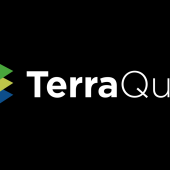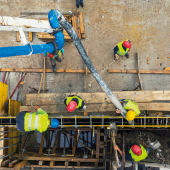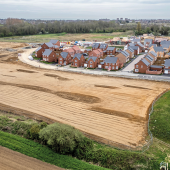View from the top

Richard Flynn CEnv CEng FCABE, of Flynn & Shaw, Ireland, discusses what ethical professionalism means to him and whether he is seeing changing behaviour patterns in the industry
For me, in simple terms, ethical professionalism is the adoption of a system of moral principles enshrined in the way we do business in the best interest of our clients and society in general. Of course, it is not as simple as that. In principle, it should be a method to enable professionals and their professional bodies to set a baseline expectation for what is socially acceptable in terms of how we make decisions and solve problems. Ethics plays an important part in both the structures of a company and how its employees carry out their duties. Leading by example is a key factor in governance and must represent best practice, which, in turn, reflects positively on employees.
Honesty and integrity
My role as Chair of the Membership and Professional Standards Committee, is concerned with professional ethics and how CABE as an association – representative of more than 9,000 professional members – ensures that the correct guidance and governance is in place to assist members in undertaking their roles and tasks with honesty and integrity.
CABE’s Technical Director, Richard Harral, recently wrote a piece in the journal about ethics. He noted that although people believe they are behaving ethically and have the best intentions, they aren’t incorporating ethics in a meaningful way in day-to-day behaviour, which means that ethics remains a concept rather than a practice. I would agree. I believe this behaviour flows from natural instincts rather than planned actions. We must ask ourselves where our moral principles come from. In the case of ethical professionalism, they must be derived from a combination of a professional code of ethics and a standard of governance that ensures compliance. This is not enough, however. I firmly believe that we must create corporate and individual accountability, as well as a culture of ethical behaviour in our associations and institutions.
A shift in focus
In the past few years, CABE’s approach to professional ethics and corporate governance has undergone a root and branch review. This, in my opinion, has resulted in a number of changes in governance. Updated publications ensure that CABE members are provided with an ethical framework to succeed in both their professional roles and their duties to clients and society as a whole. The importance of this is best summed up in the CABE Guide to Ethical Professionalism: “Professional behaviour is founded in being professionally competent, civil and polite, regardless of circumstances; ensuring that you act fairly to all parties, setting aside your own interests; and ensuring that you provide professional advice and services that reflect your duty of care to clients, co-workers and the wider public. Building engineers have a duty to uphold the highest standards of professional conduct, openness, fairness, honesty and integrity.”
A number of high-profile events have raised professional ethics to the top of the agenda in recent years. For me, two examples of note are the Paris Agreement and the Grenfell tragedy.
The 2015 Paris Climate Change Agreement, which was adopted following the Conference of the Parties (COP 21) United Nations Climate Change Conference, has been greeted as “historic, durable and ambitious”. The UN official in charge of the UN Framework Convention on Climate Change (UNFCCC), Christiana Figueres, announced that it has ignited a “huge flame of hope”, demonstrating that climate change is a “very, very good example of how we are moving to a completely new social contract”, and one that is deeply informed by the interaction between global challenges and national concerns, “enriched by the integration of North and South, East and West”.
Others, of course, would argue that we still have serious ethical issues to address in tackling climate change. In particular, there is a reasonable argument that indigenous peoples were ignored in the final version of the Paris Agreement. According to the United Nations, there are around 370 million indigenous peoples spread across 70 different countries that own, occupy or manage up to 65% of the Earth’s land surface. When the World Wildlife Fund (WWF), in its Global 200 Project of 2002, listed the top 200 areas with the highest and most threatened biodiversity, it found that 95% are on indigenous territories. Is it ethical to have excluded such a key group in the fight against climate change? As a Chartered Environmentalist, I have a keen interest in the whole area of environmental ethics and climate change, and the relationship between humans and the earth, so will be taking a great interest in COP 26, scheduled to be held in Glasgow later this year.
Planned approach to ethics
The Grenfell Tower disaster will probably be the greatest influencing factor in the role of professional associations and institutions when it comes to ethical professionalism. It is already transforming competency frameworks and will guide building regulations and standards for the next decade and beyond. Much has been written on this subject, and enquiries and hearings will, no doubt, continue for many years. One of the key messages from this disaster must be the recognition of professional competency for individuals working in industry and the important role for professional bodies in ensuring that members are working within the limits of individual competence. The importance of a planned approach to ethics will become the norm, and professional bodies such as CABE are, in my view, a leading example of what is expected and what is required in reforming our industries’ approach to competence. The work of Richard Harral and others on the Flex 8670 Built Environment – Overarching framework for competence of individuals – Specification is another milestone in this journey.
Declaring an ethical comfort zone
Interestingly, I do see a fundamental change in behaviour when it comes to professional ethics. More and more professionals are standing up and declaring that some duties are outside their comfort zone and beyond their level of competency. Much of this change is industry-led, with an awareness of the increasing numbers of professional negligence cases, and the withdrawal of insurance underwriters, affecting Professional Indemnity Insurance offerings. Whatever the cause, we are increasingly seeing professionals put ethical concepts into practice, and this is to be welcomed.
The establishment of a Membership and Professional Standards Committee is a key requirement under the terms of CABE’s UK Engineering Council Licence, to ensure that the association’s membership and professional standards are maintained and applied to the required levels. This should, in my opinion, be the norm for all associations and institutions, regardless of their status with registration bodies. I foresee increasing requirements and obligations on individual members of professional bodies to provide physical evidence of their compliance with Codes of Professional Conduct, in line with current practices for continuing professional development (CPD).
There will always be barriers to change, and there are no universal rules that apply to everyone when it comes to ethics. Regardless of what standards and regulations are required, people are human, and behaviours will undoubtedly be affected or influenced by individual beliefs, by financial and physical considerations, and by the potential for self-interest. That is why we must continue to focus on promoting ethical behaviours on the pathway to change, through universal and social inclusion at the highest levels of governance and strong leadership demonstrating the values we want others to live by. We do have a long road ahead of us, but the progress we have already achieved in terms of professional ethics is just one of many steps forward.
Author biography
Richard Flynn is a Chartered Building Engineer, Chartered Engineer, Chartered Environmentalist, Chartered Water and Environment Manager, Registered Building Surveyor and a Certified Site Assessor. He is self-employed and works in private practice as a recognised expert on site suitability assessments, treatment system design specifications, and installation and certification of on-site wastewater treatment systems.
In his volunteering capacity, he is an elected Board Member of CABE, and Chair of the CABE Membership and Professional Standards Committee. He is also Chair of the Irish Onsite Wastewater Association (IOWA) and a member of the Irish EPA Steering Committee, charged with reviewing the EPA Code of Practice for Onsite Wastewater Treatment Systems.









